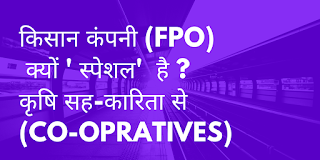FPOs-Top 10 Differences Between FPOs (Farmer Producer Organisation) & Co-operative Societies. किसान कंपनी क्यों' स्पेशल' है ? 'कृषि- सहकारिता' से
FPOs-Top
10 Differences Between FPOs (Farmer Producer Organisation) & Co-operative
Societies.
Key differences between Cooperative Societies
and Producer Companies
PARAMETER - 1.COOPERATIVE
SOCIETY 2. PRODUCER COMPANY
Registration- 1.Cooperative
Societies Act 2. Indian Companies
Act
Objectives- 1.Single
object 2.Multi-object
Area
of Operation- 1.Restricted 2.discretionary Entire Union of India
Membership- 1. Individuals and
cooperatives 2.Any individual, group,
association, producer of goods or services
Shares-1. Non
tradable 2.Not tradable but
transferable; limited to members at par value.
Profit sharing 1.Limited
dividends on shares Commensurate with volume of business Voting rights One
member, one vote, but Government and Registrar of Cooperatives hold veto power
One member, one vote. 2.Members not having transactions with the company cannot
vote.
Government control- 1.Highly
patronized to the extent of interference 2.Minimal, limited to statutory
requirements
Extent
of Autonomy -1.Limited in “real world scenario” 2. Fully
autonomous, self-ruled within the provisions of Act
Reserves -1.Created if there are
profits Mandatory to create every year Borrowing power Restricted as per
bye-law. Any amendment to bye-law needs to be approved by the Registrar and
time consuming. 2.Borrowing limit fixed
by Special Resolution in general meeting. Companies have more freedom to raise
borrowing power. Relationship with other corporate / business houses / NGOs
Transaction based Producers and corporate entity can together float a producer
company.
What
are the advantages of a Producer Company?
a. A Producer
Company is a hybrid between a Private Limited Company and a Cooperative
Society, thus enjoying the benefits of professional management of a Private
Limited Company as well as mutual benefits derived from a Cooperative Society.
b. Ownership and
membership of a Producer Company is held only by “primary producers” or
“Producer Institution/s” and member’s equity cannot be traded. Hence, nobody
can take over the company or deprive the primary producers of their
organisation.
c. The clauses of Private Limited Company shall be
applicable to the producer companies except the clauses specified in Producer
Company Act from 581-A to 581-ZL which make it different from a normal private
or limited company (refer the Producer Company Act for details). This enables a
professional framework for a Producer Company.
d. The liability of the members is limited to the unpaid
amount of the shares held by them. Hence, the private assets of the members are
safe from company losses.
e. The minimum paid-up Capital being Rs. 1 Lakh and
minimum authorized capital being Rs.5 lakh for a PC, it easy to mobilise the
small amount.
f. Minimum number
of producers required to form a PC is 10 while there is no limit for maximum
number of members and the membership can be increased as per feasibility and
need. This helps even 10 individuals start a Producer Company which is easy.
g. There cannot be
any government or private equity stake in the Producer Companies, which implies
that PC cannot become a public or deemed public limited company. Hence, any
Government or other corporate threat is non-existent in professional
functioning of the company.
h. The area of
operation for a PC is the entire country giving flexibility to expand and do
business in a free and professional manner.Why should a PO prepare a business
plan? Every business irrespective of size needs planning. Business planning is
essential for growth and sustainability. It provides broad ideas to meet the
expected and unexpected opportunities and obstacles the future holds. In case
of a PO, it is all the more essential since most of the members will be acting
as businessmen for the first time.
A business plan helps the PO in the following ways:
a. It helps in examining viability of the venture in a
particular market.
b. It provides guidance to the PO for organising and
planning activities.
c. It serves as an
important tool in accessing finance/funding.
If the financier
is comfortable with the business plan, the PO will be asked to prepare a
Detailed Project Report (DPR).
What are the elements of a business plan? The business
plan provides broad parameters for achieving the goals of the PO. A typical
business plan will contain the following: a. Executive summary b. Business Description c. Industry/Sector
analysis d. Marketing plan e. Operations plan f. Financial plan.
Manmath Biradar
Below are the links-
Instagram account- https://www.instagram.com/manmath.biradar/?hl=en
Twitter: https://twitter.com/





Comments
Post a Comment